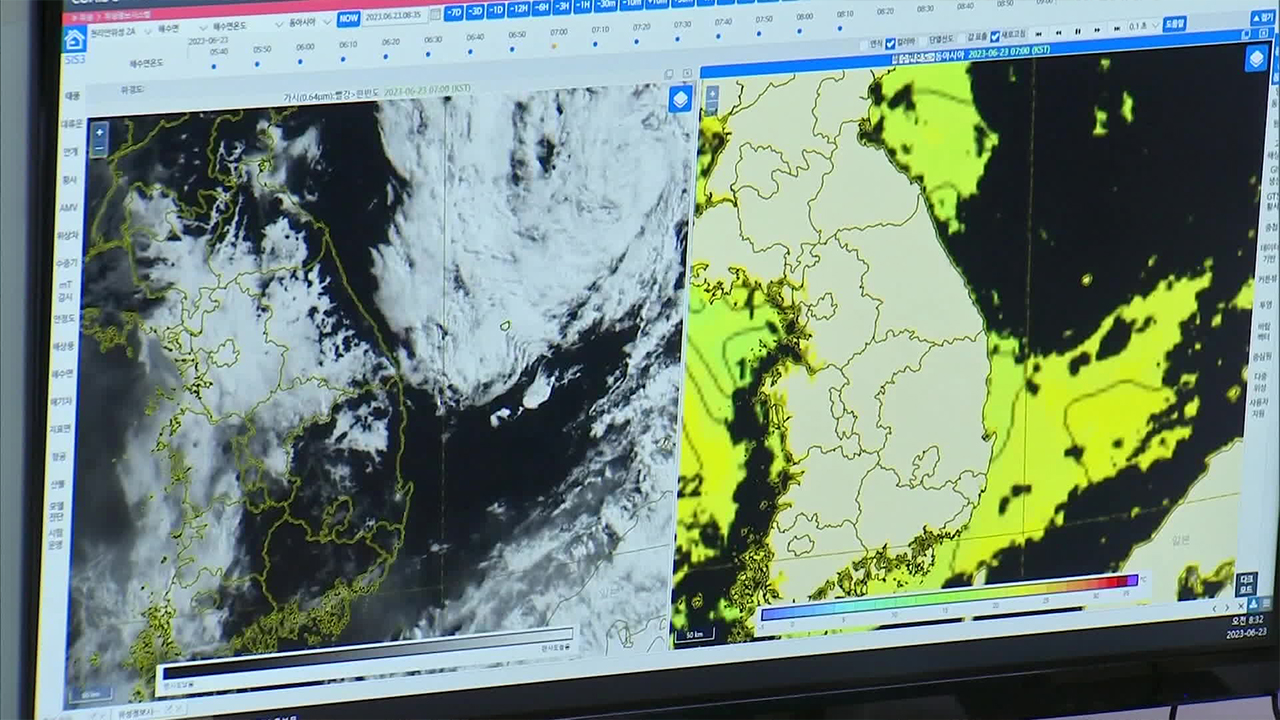AI-powered weather forecast model to be implemented next summer
입력 2024.12.03 (00:52)
읽어주기 기능은 크롬기반의
브라우저에서만 사용하실 수 있습니다.
[Anchor]
As the application areas of AI technology continue to expand, efforts are now underway to apply it to weather forecasting as well.
Research is being conducted with the goal of more accurate and faster weather predictions.
Reporter Lee Se-heum has investigated how far Korean AI forecasting has come.
[Report]
Currently, weather forecasting is based on what is known as 'numerical forecasting'.
It predicts the weather by inputting meteorological data observed through satellites and other means into complex atmospheric motion equations.
However, due to the vast amount of calculations, it takes several hours even with supercomputers.
It is also difficult to reflect real-time changes in observational data during the calculations.
Recently, research is underway to shorten forecasting time using AI, or artificial intelligence technology.
The AI precipitation prediction model developed by the National Institute of Meteorological Research in collaboration with KAIST predicts the movement of rain clouds by learning from past observational data.
The time it takes to produce a forecast for the next 6 hours is just 40 seconds.
[Lee Hye-sook/National Institute of Meteorological Research: "Numerical models take a lot of time to run. The AI model takes a long time to learn, but it only takes about 40 seconds to execute."]
Not only the speed of forecasting but also the accuracy is gradually improving.
As the amount of data learned increases, the accuracy of precipitation predictions has risen to more than 10% higher than the current numerical forecasts, and the research team explains that their model shows superior performance compared to foreign AI models.
[Lee Hye-sook/National Institute of Meteorological Research: "Google DeepMind can predict up to 90 minutes, and a model presented by Tsinghua University in China can predict up to 3 hours. I think our model consistently outperforms the Google DeepMind model..."]
The Korea Meteorological Administration plans to officially introduce precipitation forecasts using AI models starting from the summer rainy season next year.
This is KBS News, Lee Se-heum.
As the application areas of AI technology continue to expand, efforts are now underway to apply it to weather forecasting as well.
Research is being conducted with the goal of more accurate and faster weather predictions.
Reporter Lee Se-heum has investigated how far Korean AI forecasting has come.
[Report]
Currently, weather forecasting is based on what is known as 'numerical forecasting'.
It predicts the weather by inputting meteorological data observed through satellites and other means into complex atmospheric motion equations.
However, due to the vast amount of calculations, it takes several hours even with supercomputers.
It is also difficult to reflect real-time changes in observational data during the calculations.
Recently, research is underway to shorten forecasting time using AI, or artificial intelligence technology.
The AI precipitation prediction model developed by the National Institute of Meteorological Research in collaboration with KAIST predicts the movement of rain clouds by learning from past observational data.
The time it takes to produce a forecast for the next 6 hours is just 40 seconds.
[Lee Hye-sook/National Institute of Meteorological Research: "Numerical models take a lot of time to run. The AI model takes a long time to learn, but it only takes about 40 seconds to execute."]
Not only the speed of forecasting but also the accuracy is gradually improving.
As the amount of data learned increases, the accuracy of precipitation predictions has risen to more than 10% higher than the current numerical forecasts, and the research team explains that their model shows superior performance compared to foreign AI models.
[Lee Hye-sook/National Institute of Meteorological Research: "Google DeepMind can predict up to 90 minutes, and a model presented by Tsinghua University in China can predict up to 3 hours. I think our model consistently outperforms the Google DeepMind model..."]
The Korea Meteorological Administration plans to officially introduce precipitation forecasts using AI models starting from the summer rainy season next year.
This is KBS News, Lee Se-heum.
■ 제보하기
▷ 카카오톡 : 'KBS제보' 검색, 채널 추가
▷ 전화 : 02-781-1234, 4444
▷ 이메일 : kbs1234@kbs.co.kr
▷ 유튜브, 네이버, 카카오에서도 KBS뉴스를 구독해주세요!
- AI-powered weather forecast model to be implemented next summer
-
- 입력 2024-12-03 00:52:18

[Anchor]
As the application areas of AI technology continue to expand, efforts are now underway to apply it to weather forecasting as well.
Research is being conducted with the goal of more accurate and faster weather predictions.
Reporter Lee Se-heum has investigated how far Korean AI forecasting has come.
[Report]
Currently, weather forecasting is based on what is known as 'numerical forecasting'.
It predicts the weather by inputting meteorological data observed through satellites and other means into complex atmospheric motion equations.
However, due to the vast amount of calculations, it takes several hours even with supercomputers.
It is also difficult to reflect real-time changes in observational data during the calculations.
Recently, research is underway to shorten forecasting time using AI, or artificial intelligence technology.
The AI precipitation prediction model developed by the National Institute of Meteorological Research in collaboration with KAIST predicts the movement of rain clouds by learning from past observational data.
The time it takes to produce a forecast for the next 6 hours is just 40 seconds.
[Lee Hye-sook/National Institute of Meteorological Research: "Numerical models take a lot of time to run. The AI model takes a long time to learn, but it only takes about 40 seconds to execute."]
Not only the speed of forecasting but also the accuracy is gradually improving.
As the amount of data learned increases, the accuracy of precipitation predictions has risen to more than 10% higher than the current numerical forecasts, and the research team explains that their model shows superior performance compared to foreign AI models.
[Lee Hye-sook/National Institute of Meteorological Research: "Google DeepMind can predict up to 90 minutes, and a model presented by Tsinghua University in China can predict up to 3 hours. I think our model consistently outperforms the Google DeepMind model..."]
The Korea Meteorological Administration plans to officially introduce precipitation forecasts using AI models starting from the summer rainy season next year.
This is KBS News, Lee Se-heum.
As the application areas of AI technology continue to expand, efforts are now underway to apply it to weather forecasting as well.
Research is being conducted with the goal of more accurate and faster weather predictions.
Reporter Lee Se-heum has investigated how far Korean AI forecasting has come.
[Report]
Currently, weather forecasting is based on what is known as 'numerical forecasting'.
It predicts the weather by inputting meteorological data observed through satellites and other means into complex atmospheric motion equations.
However, due to the vast amount of calculations, it takes several hours even with supercomputers.
It is also difficult to reflect real-time changes in observational data during the calculations.
Recently, research is underway to shorten forecasting time using AI, or artificial intelligence technology.
The AI precipitation prediction model developed by the National Institute of Meteorological Research in collaboration with KAIST predicts the movement of rain clouds by learning from past observational data.
The time it takes to produce a forecast for the next 6 hours is just 40 seconds.
[Lee Hye-sook/National Institute of Meteorological Research: "Numerical models take a lot of time to run. The AI model takes a long time to learn, but it only takes about 40 seconds to execute."]
Not only the speed of forecasting but also the accuracy is gradually improving.
As the amount of data learned increases, the accuracy of precipitation predictions has risen to more than 10% higher than the current numerical forecasts, and the research team explains that their model shows superior performance compared to foreign AI models.
[Lee Hye-sook/National Institute of Meteorological Research: "Google DeepMind can predict up to 90 minutes, and a model presented by Tsinghua University in China can predict up to 3 hours. I think our model consistently outperforms the Google DeepMind model..."]
The Korea Meteorological Administration plans to officially introduce precipitation forecasts using AI models starting from the summer rainy season next year.
This is KBS News, Lee Se-heum.
-
-

이세흠 기자 hmm@kbs.co.kr
이세흠 기자의 기사 모음
-
이 기사가 좋으셨다면
-
좋아요
0
-
응원해요
0
-
후속 원해요
0










![[단독] “윤석열·김용현 등 공모해 군사상 이익 해쳐”<br>…외환죄 대신 일반이적죄 적용](/data/layer/904/2025/07/20250714_3VTJV3.jpg)




이 기사에 대한 의견을 남겨주세요.